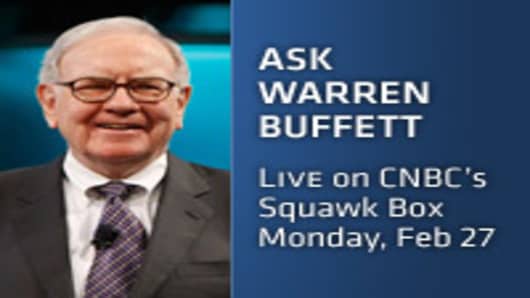Berkshire wrote down that investment by $1 billion in 2010 and another $390 million in 2011 and may wind up wiping out almost all of the remaining $878 million in carrying value.
Buffett writes that "in tennis parlance, this was a major unforced error by your chairman."
Share Repurchases
Buffett says Berkshire's previously announced share buyback plan resulted in just $67 million of purchases over a few days in September, as the stock price quickly topped its pre-determined upper limit of 110 percent of book value.
Buffett writes that "given the opportunity, we will likely repurchase stock aggressively at our price limit or lower" but "we have no interest in supporting the stock and our bids will fade in particularly weak markets."
Wants IBM Shares to 'Languish'
Buffett devotes several paragraphs to one of his favorite themes: investors who will be buying in the future should be happy, not sad, when stock prices fall.
"When Berkshire buys stock in a company that is repurchasing shares, we hope for two events: First, we have the normal hope that earnings of the business will increase at a good clip for a long time to come; and second, we also hope that the stock underperforms in the market for a long time as well. A corollary to this second point: 'Talking our book' about a stock we own — were that to be effective — would actually be harmful to Berkshire, not helpful as commentators customarily assume."
Buffett uses Berkshire's stake in IBM as an example. He says the company will probably spend $50 billion or so over five years to repurchase shares. As a result, "We should wish for IBM's stock price to languish" over that time period.
"The logic is simple: If you are going to be a net buyer of stocks in the future, either directly with your own money or indirectly (through your ownership of a company that is repurchasing shares), you are hurt when stocks rise. You benefit when stocks swoon. Emotions, however, too often complicate the matter: Most people, including those who will be net buyers in the future, take comfort in seeing stock prices advance. These shareholders resemble a commuter who rejoices after the price of gas increases, simply because his tank contains a day’s supply."
He admits, however, that he and Munger "don't expect to win many of you over to our way of thinking — we've observed enough human behavior to know the futility of that."
His personal revelation came after reading Chapter Eight of Ben Graham's The Intelligent Investor. "Picking up that book was one of the luckiest moments of my life."
Todd and Ted
Buffett says new portfolio manager Todd Combs built a $1.75 billion portfolio (at cost) in 2011, and Ted Weschler, who joined Berkshire shortly after the end of the year, will "soon create one of similar size." He apparently wants the two men to work as a team, revealing that each of them "receives 80% of his performance compensation from his own results and 20% from his partner's."
Buffett also notes, as he has in the past, that when Berkshire's quarterly portfolio filings show "relatively small holdings, they are not likely to be buys I made (although the media often overlook that point) but rather holdings denoting purchases by Todd or Ted."
Book Value
Buffett reports that Berkshire's per-share book value increased by 4.6 percent in 2011, outperforming the S&P's 2.1 percent gain, including dividends.
He uses book value as a "useful, though considerably understated, proxy" for intrinsic business value, his way of measuring his performance.
Berkshire's stock price underperformed the S&P's, excluding dividends, with a 4.7 percent drop last year. The benchmark stock index was flat.
Current Berkshire stock prices:
Class B:
Class A:
Keep up with Warren Buffett on CNBC.com and follow alexcrippen on Twitter.
Email comments to buffettwatch@cnbc.com




